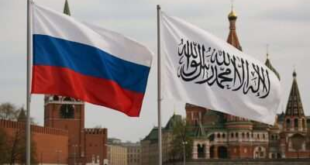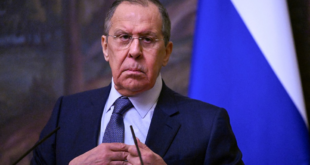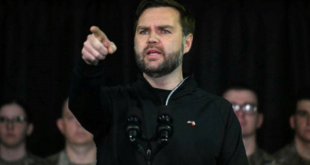Georgy Asatryan, an expert on Afghanistan, at the Russian Academy of Sciences, as well as a member of Russian International Affairs Council gave an interview to Hayk Khalatyan of the Eurasia Daily on developments in Afghanistan. He called the Taliban victory “an extremely harmful and dangerous example for the international relations system and stability as a whole.” How did this gloomy description fit with Russia’s current policy of courting the Taliban?[1] Asatryan tried not to step on too many toes, and called the architects of Russia’s Afghanistan policy experienced hands. Moreover, the policy towards the Taliban represented an experiment in which Russia abandoned its traditional policy of fighting radical Islamic movements and was worth a try even though this was unknown territory. However, Asatryan let slip that opposition to the policy existed within Russian policy making circles, but the advocates of conciliation were now running the show. Russia, he predicted, would soon go back to a policy of working with the Taliban’s ethnic enemies and using its military superiority to check the spread of Taliban influence.
“How long will the Afghan authorities survive without direct US military aid? How will the Taliban’s rise to power affect the region? What is Russia’s current position on the Afghan question? Georgy Asatryan, an expert on Afghanistan, a researcher at the Plekhanov Russian University of Economics and the Russian Academy of Sciences, a RIAC expert at the Valdai Club, answered these and other questions for EADaily.”
—The news from Afghanistan about new Taliban military successes keeps coming. How long can the Afghan authorities hang on without direct U.S. military aid?
— The situation in the Islamic Republic of Afghanistan is extremely complicated. Perhaps we this is the worst state of affairs military-wise. The Taliban has emerged victorious. Radicals have a firm control of almost the entire countryside in the country. Historically speaking the Taliban’s influence was strong in the country’s south and east. But today, things are different; the Taliban is everywhere. They are present where there are no roads, no communications, no infrastructure. The Taliban is the authority in the countryside, they already have power there. And since Afghanistan is essentially a rural country, the Taliban in fact already control the bulk of its territory, with exception of governorate capitals, county centers and major cities. The Afghan army’s large and fairly combat-ready units are billeted there. The families of the military personnel also live in these same governorate capitals.
In recent months the Taliban victories frequently occurred according to the following patter: the Afghan military and Interior Ministry’s units simply withdrew into governorate and district capitals without battles or resistance. The Taliban entered without fighting. Fierce clashes were uncommon. The Afghan army’s budget, 80% of which is created by a US subsidy, is 6 billion USD a year; it’s estimated that the Taliban’s [military budget] is from 300 million to 1.5 billion USD [per year]. The Afghan Army’s manpower is 350,000 versus 40,000-70,000 of that of the Taliban. But the results are obvious. The situation with Kabul is special.
Historically the Kabul zone (the capital and its suburbs) served as a natural border of the notional Afghanistan, [the territories of] between the so-called national minorities and Kabuli (residents of Kabul) and the mostly Pashtun populated south-east of the country.
The most combat-ready Central Army Corps, with a manpower of 20,000-25,000 soldiers, guards the capital. The soldiers’ families also live in Kabul, so the Central Army Corps will defend the capital till the end. Theoretically speaking they still have an option to retreat further to the north, but in that case, they will become ‘refugees from Kabul,’ which is not a very respected status in the rest of the governorates. Besides, according to constructivist theory of international relations and Alexander Wendt’s findings, anarchy is what the great powers make of it. The world events are, in one way or another, are influenced by the most influential states. I continue to argue (since even before the troop withdrawal decision was announced) that a quasi-consensus surrounding Afghanistan exists among the great and regional powers. Almost all major powers are interested in a relatively stable Afghanistan, with the possible exception of the Pakistani leadership’s security wing. Afghanistan has become truly tiresome. I believe that [the great powers] won’t allow the Taliban to take over Kabul, at least in the coming months (or, probably, years.)
— Why the Taliban is so successful military wise? How are they able to defeat a larger and better equipped government army?
— As I said before, the Taliban are at the height of their power. There are several reasons for this. First, Pakistani support [of the Taliban] is at its peak.
Islamabad, or more precisely, Rawalpindi (which is the center of the Pakistani military) is on the rise. They are on a roll. The Americans have practically withdrawn [from the country]; they have turned the page on the Afghan war for them. Pakistani influence fills the political vacuum. The Taliban is one way or another a tool of Pakistani geopolitical and military influence. According to some sources, from several hundred to a thousand militants cross the Afghan-Pakistani border almost every day in order to join the Taliban. Pakistani politicians and military officers openly meet with leaders of the Taliban’s militant wing in Islamabad and Rawalpindi.
The UN Special Representative for Afghanistan sounds the alarm. The unprecedented strengthening of the Taliban has been accompanied by violence against the civilian population. In Kandahar and Herat, in just 10 days of fighting more than 100 civilians were murdered by the Taliban, 400 were disabled. Generally, civilians posed no threat to the movement. The Taliban have already started violent crackdowns against Afghan comedians, artists and non-religious people in general (basically against everyone, who, according to their understanding lives in violation of Sharia law). Recent data, gathered by anthropologists show that even in the most remote countryside areas, Afghan residents use smartphones. However, the Taliban prohibits it. In many ways, the Taliban militants resemble guerrillas wearing galoshes armed with weapons from the 1970s. But the situation is changing.
One can find on the web or in Afghan press a lot of publications, which depict the equipment and arms of several of the most battle-ready Taliban groups. And they are no longer simple villagers in galoshes. They are young, well equipped and armed, and bent on revenge. Theoretically speaking any successful insurgent group can exist due to foreign support. According to the theory, such support will be most successful when provided from the neighboring state. The multifaceted and rather substantial support [for the Taliban] from abroad is obvious. This increased support from Pakistan as well as the withdrawal of [the US troops] and the appearance of a power vacuum have led to the current successes of the Taliban.
I won’t retell the story of the Taliban as a movement, because it’s well known. The Taliban was created by Pakistan’s Inter-Services Intelligence (ISI). The latter, by the way, was created thanks to British assistance. This is also true for the ‘Haqqani Network’ terrorist group, which is part of the Taliban. I would dispute claims of the Taliban’s independence. At least, scientific theories on insurgents’ movements and counterterrorism in principle deny the existence of such organizations.
— What are the consequences for the region of the Taliban coming to power?
— I would single out two aspects. One is worse than the other. First, the Taliban’s victory is graphic empirical evidence that it is possible to come to power via subversive activities and terrorism. It will effectively serve as an example for similar organizations around the world. This, as you can clearly see for yourself, is an extremely harmful and dangerous example for the international relations system and stability as a whole. Second, it is an empirical example for states that support such organizations. The logic here is a personification of the state’s correlation with the individual. Certain powers might think, ‘If a country can have its own terrorist organization and 20 years later bring it to power, why can’t we do the same?’ These are dangerous developments. The total and unconditional victory of the Taliban means in fact a victory for terrorism and the strengthening of this factor in Afghanistan, the entire region and in world affairs.
— And what is Russia’s current position on the Afghan question?
— It is very important to look at the issue from Russia’s point of view. Again, this is my opinion. What is the essence of the negotiations of the process? It’s all about national reconciliation. The parties are striving that an agreement on the cessation of hostilities would be reached between Kabul and the Taliban. By ‘Kabul,’ I mean all strata of Afghan society, i.e. field commanders, local authorities, the so-called ‘Northern Alliance,’ Tajik factions, Uzbek troops, and Hazara groups. Russia has achieved some diplomatic success in this regard. The Taliban and Kabul are negotiating constantly. Afghan politics is basically an auction. In this sense military action is a tool of negotiation, an attempt to strengthen one’s position. The Taliban knows how to rotate between negotiations and war. This is a deliberate and accepted armed tactic.
Moscow by its actions sought to prompt the parties into active negotiations. This is particularly true for official Kabul, which in principle didn’t fully comprehend the idea of the Americans’ withdrawal. First, it seems, that the ruling circles in Arga (the presidential palace in Kabul) didn’t believe that the current scenario was probable. Afghan politicians thought that the Americans would remain in the country forever. Moscow, for its part, understood where things were going.
Second, for a country that claims to be an important world power to have no policy at all on Afghanistan is an unforgivable luxury. Actors in international policy, according to all the basic theories, are rational entities. I believe Russia is inferior to the US and the ‘global West’ in soft power and alternative instruments of influence. It’s unlikely that such a gap can be closed in the foreseeable future. In many ways Russian foreign policy, in my opinion, is guided by security issues. Regarding the Afghanistan issue, it’s important for Moscow to minimize the threats of exporting terrorism and extremist ideology to the north. It is important for Afghanistan not to become an incubator of international terrorism, as was the case back in 1996-2001.
Let me recall that back in the 1990s, under the Taliban, the Islamic Emirate of Afghanistan provided various support to the terrorist groups in Russia, which fought against the federal center. I once found a document in the archives from that era that was signed by the Taliban and the so-called Ichkeria [Chechen Republic of Ichkeria]. Anyways this is a problem. Using scientific terminology, a rational policy is obligated to anticipate possible events. By this logic, I can conclude that Moscow tried to create diplomatic contacts with the Taliban, to lower threats on their part to Russian interests in the future. Russian foreign policy is often condemned for its reactionary character and lack of initiative. Well, this was an original initiative.
Any initiative is an experiment, or even a venture from a conservative point of view. By taking an initiative, you often find yourself in unfamiliar territory. Throughout history Russia has fought and feuded with radical Islamist forces. Perhaps for the first time in history (at least I cannot recall other cases), Moscow doesn’t actually oppose them. One might think that this smacks of indirect support at the diplomatic level. Someone might even claim that Russia somehow legitimized the Taliban. But for the last 15 years, diplomats from the US, Britain, Japan, Norway, Turkey, Saudi Arabia, China, Qatar, etc. have been negotiating with the Taliban. True, an initiative is an experiment with many variables. It seems to me that the main issue for Russia is for terrorism and radical ideology to not spread to Central Asia. The maximum goal is to have a friendly government in Afghanistan. But this is not the main thing, Russia can do without this. Only time will tell what will be the results of this strategy.
In per se poses the main threat. What will they do after achieving the victory in Afghanistan, after strengthening [their forces]. This is the main question. The Chinese factor is very important here too. It’s rarely mentioned, but Beijing has reached an agreement with the Taliban, effectively it’s a sort of non-aggression treaty. The Pakistanis, who have long been allies of China, rather than of the ‘global West’ and the US, have managed to assure the Chinese that the Taliban will not threaten their infrastructure projects. According to Alexander Wendt’s findings, the great powers (as well as regional ones) are invisible agents of the [political] process; they determine what this state of anarchy will be. The realist understanding of anarchy in international relations is a relative concept. I would argue that it was partially refuted. Thus I cannot agree with the position shared by some Russian officials, that the Taliban are not affiliated with Pakistan.
This is theoretically impossible. Any insurgent group depends on the patron’s support, often this role is played by a neighboring state-sponsor. Otherwise, it won’t be successful and its fate will be rather short. For instance, Iran needs Syria to support Hezbollah because this country borders Lebanon. Thus, Russia’s policy follows a pilot strategy; attempts are being made to secure the country and its interests. Whether it will be successful, only time will tell. There are many hidden threats, regarding the issue. It is very difficult to foresee everything. If the expectations prove unjustified, precision strikes at radical positions in northern Afghanistan are an option. Given the technical superiority of Moscow’s latest long-range and precision weapons, this is a fairly simple scenario. Also, [the Kremlin] can anytime join the anti-Taliban coalition and start supporting field commanders and national minorities fighting against radicals.
It’s important to retain the trust of the anti-Taliban forces in the region, i.e. of the Central Asian countries (Uzbekistan, Tajikistan, India, Iran) and the Afghans, who are the enemies of the Taliban. The excessive strengthening of radicals is not good news, to put it mildly. Now Iran has engaged in actively funding and support anti-Taliban forces among the Shiite Hazaras and Tajiks. The US and certain European countries are also actively helping these warlords. India supports anti-Taliban forces too. But Moscow took a different approach. Perhaps greater balance and a more multi-directional Afghan policy would work better. In my opinion this will come with time. Also, I predict a serious anti-Taliban campaign in the world media and the international community. Their [the Taliban] ferocity will only grow. There is hardly any point in associating with these people. To support the diplomatic efforts of Afghan forces is the right thing to do. But I think we [Russia] need to distance ourselves from the Taliban.
— Should Russia, along with its allies and partners in Central Asia interfere in the Afghan events? Maybe it would be wiser to wall off Afghanistan and its problems behind an ‘iron curtain’ in order to avoid a large-scale involvement in the Afghan conflict?
— It’s rather difficult. The plan sounds nice, but in practice, it will be hard to implement. There are conflicts to which actors who have some pretensions [to high status] in the world system cannot ignore. The Syrian conflict allowed Russia to get important experience, it sparkled resurgent interest in the army and the development of the military-industrial complex. I am not making an analogy, of course, I’m talking about the approach. The Soviet Union intervening in Afghanistan was a deplorable mistake. The Afghan syndrome will stick with us for a long time, thank God for that. Thus, direct interference [to the Afghan conflict] should be avoided. Frankly speaking, I see few preconditions and possibilities for such a scenario to develop. Some Central Asian countries, especially Uzbekistan, are quite independent and self-sufficient powers in international politics. Russia is deciding here, let’s face it, to deal with geopolitical problems and strengthens its regional influence. Where Moscow is the leader it’s the military component and security issues [that count]. Maybe Russia’s current strategy won’t last forever.
I still believe that after conclusively strengthening the Taliban, Pakistan will strive to reduce or completely eliminate Russian contacts with them. The Pakistanis want to have control of entire Taliban. There was a joke on social networks about this issue, ‘Russia has Wagner Group, the US has Blackwater, and Pakistan has the Taliban.’ In my opinion, this joke is not far removed from the truth. By the way, I believe the Iranians also share this understanding. They maintain contacts with certain groups of Taliban in western Afghanistan, but are apprehensive that after the Taliban strengthens, the Pakistanis will try to stop these contacts. In Afghan politics, balance is important. Russia’s current efforts seem to me to be rather sound.
Fairly experienced people work on the Afghan direction in Moscow. Theoretically, certain approaches may turn out to be tactical and temporary, not strategic. But there are different opinions, including those that criticize the current strategy. It seems to me that the wisest approach, is the one implemented back in the 1990s, when Russia, Iran, and India were focused on, let’s say, northern powers. Even in Russia, I believe, there are still serious supporters of such policy. However, proponents of other approaches are running the show.
— In the late 1990s Tajiks and Uzbeks of the Northern Alliance played the leading role in the resistance to the Taliban. Now the Taliban demonstrates serious victories in the north of the country. What has changed in Afghanistan’s minorities’ relations with the Taliban? Do they still perceive the Taliban as an enemy?
— No, the Taliban on one side and the Tajiks and Uzbeks on the other regard each other as enemies. Little has changed in this regard. All the leaders of the so-called ‘national minorities’ mobilized their troops against the Taliban. As I mentioned previously, the alliance of Russia, Iran, India and Central Asian countries as well as the support for northern groups, historically appears more rational and natural in the long run. Tandems and alliances in international relations are not perpetual. National interests and identity cannot contradict each other for long. Tactically, this can work, but it can hardly work strategically. At least, that is what the theories of realism and constructivism tell us.
— Turkey shows an interest in maintaining a military presence in Afghanistan (i.e. in managing the Kabul airport) if the US provides support. What are Ankara’s interests, especially given the sharply negative reaction of the Taliban to such plans? Is it possible for Turkey to interfere in the Afghan conflict?
— Many powers, including Russia, oppose this decision. Ankara is already guarding the airport, and considering the Afghan realities this means that the country de facto controls the Kabul airport. For a better understanding of what is transpiring, we need a better comprehension of this facility’s role. It is the main airport used by diplomats, international organizations, the UN, the military, and intelligence officers. If the situation in the country or the capital deteriorates, diplomatic personnel will be forced to evacuate through this airport. This already occurred in the mid-1990s, when the Taliban came to power. The statements of diplomatic representatives of various countries illustrate the airport’s importance. For instance, when it became known that US will leave the country, diplomats were concerned whether it will be safe to continue with their work.
They mean that if the airport in Kabul is not properly protected, they’ll refuse to remain in the country. Thus, the country that will be responsible for the airport’s protection, will increase its influence in Afghan affairs, while other powers will be to some extent dependent on it. Turkey will effectively know, who arrives in Afghanistan, in what numbers, and, consequently, understand the purpose of each flight to Kabul airport. Basically Ankara, through the US assistance has increased its influence in Afghanistan. Kabul airport is a very important facility. We can witness the process of transfer of responsibility by the U.S. to its partners in the region. Earlier I called it a contractor’ politics. The Americans use their partners [in the region] as contractors and transfer responsibility for different areas of Afghan politics and economy to them. Ankara has a quite complex diplomacy. On the one hand, the Turks have a tight alliance with Pakistan; on the other hand, Ankara it is NATO member and the US ally.
— After the Americans dethroned the Taliban, drug production increased tenfold in Afghanistan. Can one expect the Taliban to introduce a tough policy against drug production and trafficking, provided they assert control over the entire country’s territory?
- I don’t think so. On the contrary, the Taliban will continue the same policies. It is inevitable that the drug production will change shareholders. The Taliban will still grow and export drugs. It is also a myth that the Taliban opposed the drug business. In Afghanistan you are unlikely to find people who’ll actually oppose drug production.
 Eurasia Press & News
Eurasia Press & News



